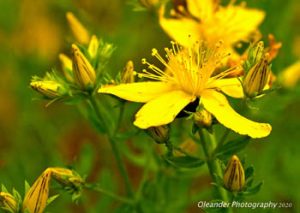See Question
Answer: St. John’s wort
Explore This Issue
ACEP Now: Vol 39 – No 06 – June 2020Attributes
St. John’s wort is an herb with a yellow flower that has five petals and many stamens, often united in bundles. These plants have simple opposite or whorled leaves that are gland-dotted and usually smooth-margined. The fruits are dry capsules.
The medicinal parts used include the stem, petals, and flowers.
The two major chemicals are hypericin and hyperforin, and they interact with the neurotransmitters serotonin, dopamine, and norepinephrine.
History
The plant has been used since ancient Greek times for many ailments and illnesses including problems with the kidneys and lungs, sleeping (insomnia), and mood. It is named after St. John the Baptist, as it blooms around the celebration day (late June).
The term “wort” is ancient and comes from Middle English, from Old English “wyrt,” meaning root, herb, or plant.
Current Use
St. John’s wort is most often used as a supplement for menopausal symptoms and depression and other mental health issues. Some believe it improves wound care.
Preparations of the herb include teas, tablets, capsules, and liquid extracts. Topical preparations are also available.
In the Literature
St John’s wort is one of the oldest and best-investigated medicinal herbs and has a strong support for its use in Europe. However, the supportive literature-based data are still indefinite.
A 2009 German article summarized selected data and suggested that St. John’s wort may be better for major depression compared to placebo and standard prescription antidepressant medication, with fewer side effects.1 These findings were more supportive of its use than studies done in the United States.
A 2002 JAMA study comparing H. perforatum, placebo, and sertraline failed to show efficacy of H. perforatum in moderately severe major depression.2
A 12-week clinical trial comparing St. John’s wort, citalopram, and placebo found no difference between the three groups.3
Investigations into longer-term therapy include a 26-week clinical trial in 2012 that compared St. John’s wort with sertraline and a placebo group and found all three groups had similar effectiveness in treating depression.4
Mechanism of Action
More than 50 chemical compounds have been isolated. Hyperforin and adhyperforin induce noncompetitive reuptake inhibition of monoamines (specifically dopamine, norepinephrine, and serotonin), GABA, and glutamate.
Safety and Side Effects
Nearly 100 prescription drugs are known to interact with St. John’s wort.
Interactions with certain antidepressants (selective serotonin reuptake inhibitors) can lead to a potentially life-threatening serotonin syndrome: altered mental status, diarrhea, fast heartbeat, high blood pressure, hallucinations, increased body temperature, and seizures.5
It may also worsen symptoms of bipolar disorder and schizophrenia.
St. John’s wort can interact with other medications, including causing an increase or decrease in their effects These medications include antidepressants, phenytoin, alprazolam, barbiturates, bupropion, statin medications, dextromethorphan, oral contraceptives, triptans, cyclosporine, digoxin, oxycodone, indinavir, ketamine, irinotecan, and warfarin.5,6
St. John’s wort can also cause photosensitivity.6
References
- Linde K. St. John’s wort—an overview. Forschende Komplementärmedizin. 2009;16(3):146-155.
- Hypericum Depression Trial Study Group. Effect of Hypericum perforatum (St. John’s wort) in major depressive disorder: a randomized controlled trial. JAMA. 2002;287(14):1807-1814.
- Rapaport MH, Nierenberg AA, Howland R, et al. The treatment of minor depression with St. John’s wort or citalopram: failure to show benefit over placebo. J Psychiatr Res. 2011;45(7):931-941.
- Sarris J, Fava M, Schweitzer I, et al. St. John’s wort (Hypericum perforatum) versus sertraline and placebo in major depressive disorder: continuation data from a 26-week RCT. Pharmacopsychiatry. 2012;45(7):275-278.
- John’s wort and depression: in depth. National Institutes of Health website. Available at: https://www.nccih.nih.gov/health/st-johns-wort-and-depression-in-depth. Accessed May 11, 2020.
- John’s wort. Mayo Clinic website. Available at: https://www.mayoclinic.org/drugs-supplements-st-johns-wort/art-20362212. Accessed May 11, 2020.
Pages: 1 2 | Multi-Page







No Responses to “Toxicology Answer: What Saintly Flower Has Been Investigated as a Treatment for Depression?”